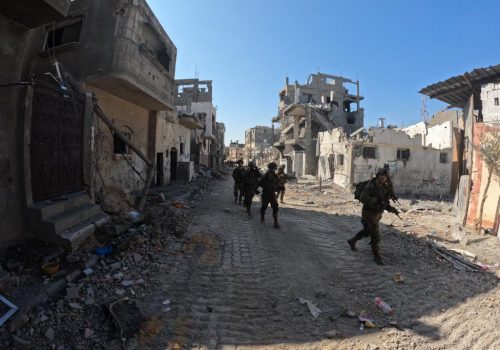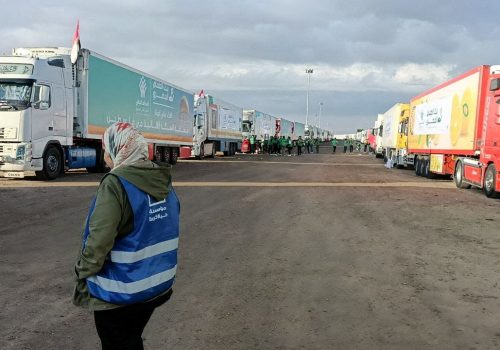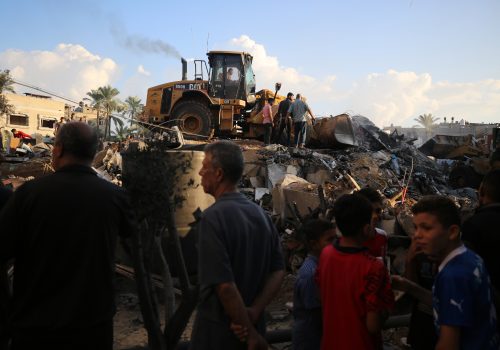Update: Israel claims it is no longer occupying the Gaza Strip. What does international law say?
Author’s Note: This piece provides updates to the October 31, 2023 article “Israel claims it is no longer occupying the Gaza Strip. What does international law say?” as well as the February 16, 2024 article “Could the US and other states be implicated in South Africa’s genocide case against Israel?”
On July 19, the International Court of Justice (ICJ) released an Advisory Opinion (AO) on the Legal Consequences Arising from the Policies and Practices of Israel in the Occupied Territory, Including East Jerusalem. This was issued in response to a 2022 United Nations General Assembly resolution requesting the AO to address Israel’s ongoing policies and practices in relation to the Occupied Palestinian Territories (OPT), both in terms of the legal consequences and the effect they have on “the legal status of the occupation.” Ultimately, the court voted eleven to four that Israel’s occupation of the OPT is unlawful.
In arriving at that and other conclusions, the AO addressed a variety of Israel’s specific actions in the OPT, though it avoided addressing several issues, including Palestinian statehood. This built on a related 2004 AO on the Legal Consequences of the Construction of a Wall in the Occupied Palestinian Territory. The 2004 AO “set out the circumstances under which a state of occupation is established” but responded to a comparatively narrow question and was more limited in its findings.
While AOs have limitations, that does not detract from the significance of the 2024 AO’s findings. AOs are non-binding on states, unlike the ICJ’s contentious cases like South Africa v. Israel. Because of this, a state cannot bring a case against Israel or others if they do not comply with the holdings, and even if the ICJ had enforcement powers, there is nothing binding to enforce. However, AOs still have “law-making” power, setting expectations for international actors that develop into customary international law and confirming existing practices that already constitute customary international law—which is binding on all states.
SIGN UP FOR THIS WEEK IN THE MIDEAST NEWSLETTER
Indeed, on September 18, the UN General Assembly adopted a draft by Palestine and “stem[ming] from” the AO. The resolution calls for, inter alia, “Israel to comply with international law and withdraw its military forces, immediately cease all new settlement activity, evacuate all settlers from occupied land, and dismantle parts of the separation wall it constructed inside the occupied West Bank.” The vote was “overwhelmingly” in favor of adoption, with 124 states voted in favor, fourteen voting against, and forty-three abstaining. While resolutions adopted by international organizations cannot create a rule of customary international law, they may provide evidence to determine the existence of customary international law or “contribute to its development.”
What did the Advisory Opinion find regarding Israel’s policies and practices?
In its written statement and comment and public hearing testimony, Palestine offered evidence and legal arguments of Israel’s violations of its obligations under international law. Israel submitted a written statement, which was comparatively brief—five pages to Palestine’s 371 pages—offering a limited view of its arguments. It noted, however, that it “consider[ed] the request for an advisory opinion made therein as contrary to the established legal framework governing the Israeli-Palestinian conflict, and an abuse of international law and the judicial process.” Still, the court considered Israel’s security concerns to be “common knowledge presumptively accessible to the judges” and took them into account in deliberations.
Because it was limited to addressing the General Assembly’s questions in the request, the AO did not address Israel’s conduct in the Gaza Strip in response to the October 7, 2023 attack. However, it made clear that the OPT includes the Gaza Strip despite the 2005 “disengagement.” It also added that the circumstances leading to its conclusion that Israel had the requisite control there were “even more so since” October 7.
In considering Israel’s policies and practices, the AO looked at Israel’s settlement policy and the questions of prolonged occupation, annexation, discriminatory legislation and measures, and self-determination.
First, regarding settlements, the court only considered the West Bank and East Jerusalem but noted that the settlement policy carried out in the Gaza Strip until 2005 “was not substantially different from” the current policies in the West Bank and East Jerusalem. The court found Israel acted contrary to the obligations established in the Fourth Geneva Convention, which addresses the protection of civilian persons during war, and the Hague Regulations, which govern the laws and customs of war on land.
Namely, the transfer of settlers to the West Bank and East Jerusalem and “Israel’s maintenance of their presence,” and policies and practices, including “forcible evictions, extensive house demolitions, and restrictions on residence and movement,” are contrary to Article 49 of the Fourth Geneva Convention. The confiscation of land for Israeli settlements at the detriment of the local Palestinian population is contrary to Articles 46, 52, and 55 of the Hague Regulations, and Israel’s exercise of its “regulatory authority as an occupying Power” is inconsistent with Article 43 of the Hague Regulations and Article 64 of the Fourth Geneva Convention. Israel’s failure to effectively prevent or punish and its use of, excessive use of force against Palestinians creates and maintains a “coercive environment” and is contrary to Article 46 of the Hague Regulations, Article 27 of the Fourth Geneva Convention, as well as Article 7 of the International Covenant on Civil and Political Rights (ICCPR).
Additionally, looking at relevant caselaw and UN documents, the court found that Israel’s use of the OPT’s natural resources—including diverting resources to its population and severely restricting Palestinians’ access to water—is inconsistent with its obligations “to respect the Palestinian people’s right to permanent sovereignty over natural resources.”
Turning to the question of annexation, the court first found that Israel’s policies and practices, such as “the maintenance and expansion of settlements, the construction of associated infrastructure, including the wall, the exploitation of natural resources, the proclamation of Jerusalem as Israel’s capital, the comprehensive application of Israeli domestic law in East Jerusalem and its extensive application in the West Bank…amount to annexation of large parts” of the OPT. This is contrary to the prohibition of the use of force, reflected in Article 2(4) of the UN Charter and elsewhere termed “acts of aggression,” and of forcible annexation.
Regarding discriminatory legislation and measures, the court first held that Israel’s “comprehensive restrictions” on Palestinians in the OPT “constitutes systemic discrimination based on, inter alia, race, religion or ethnic origin.” This violates Articles 2(1) and 26 of the ICCPR, Article 2(2) of the International Covenant on Economic, Social and Cultural Rights, and Article 2 of the International Convention on the Elimination of All Forms of Racial Discrimination (CERD). The court also found that Israel breached Article 3 of the CERD, which prohibits racial segregation and apartheid, noting a “near-complete separation,” both physically and juridically, “in the West Bank and East Jerusalem between the settler and Palestinian communities.” It did not specify whether it considers the situation to be racial segregation or apartheid, though several judges weighed in with separate opinions or declarations.
Finally, the court held that the “prolonged character of Israel’s unlawful policies and practices aggravates their violation of the right of the Palestinian people to self-determination.”
What did the Advisory Opinion conclude based on those findings?
Based on the above findings, the court looked at how Israel’s policies and practices affected the legal status of the occupation. Namely, it found that “the sustained abuse by Israel of its position as an occupying Power, through annexation and an assertion of permanent control over the Occupied Palestinian Territory and continued frustration of the right of the Palestinian people to self-determination, violates fundamental principles of international law and renders Israel’s presence in the Occupied Palestinian Territory unlawful.”
The AO had seven substantive holdings, four of which applied exclusively to Israel’s obligations:
- Israel’s continued presence in the OPT is unlawful.
- Israel has an obligation to “bring an end to its unlawful presence” in the OPT “as rapidly as possible.”
- Israel has an obligation “to cease immediately all new settlement activities and to evacuate all settlers from” the OPT.
- Israel has an obligation to make reparation for the damage caused in the OPT.
The remaining three substantive holdings concern states or international organizations:
- States have an obligation not to recognize “the situation arising from” Israel’s unlawful presence in the OPT as legal and not to “render aid or assistance in maintaining the situation created by the continued presence” of Israel in the OPT.
- International organizations, including the UN, have an obligation not to recognize “the situation arising from” Israel’s unlawful presence in the OPT as legal.
- The UN, and especially the General Assembly and the Security Council, “should consider” what needs to be done to “bring to an end as rapidly as possible” Israel’s unlawful presence in the OPT.
The UN General Assembly resolution adopted on September 18 corresponds with these holdings while also adding additional conclusions. For example, it recognizes that Israel must be held accountable for violations of international law and calls upon states to take steps to ensure that their nationals “do not act in any way that would entail recognition or provide aid or assistance in maintaining the situation created by Israel’s illegal presence” in the OPT, and to take steps “towards ceasing the importation of any products originating in the Israeli settlements, as well as the provision or transfer of arms, munitions and related equipment to Israel…in all cases where there are reasonable grounds to suspect that they may be used in the Occupied Palestinian Territory.”
How does the Advisory Opinion apply to the accountability efforts related to the ongoing conflict in Gaza?
Because the AO is not binding and did not address Israel’s actions taken in response to the October 7 attack, it sits separately from accountability efforts related to the conflict, such as domestic proceedings, the ICJ contentious cases alleging genocide, and the International Criminal Court investigation and potential cases. However, the AO is still related to these cases. Namely, it confirms that the Gaza Strip was occupied at the time of the attack, meaning that Israel’s obligations as an occupying power applied continuously over that time.
What does the Advisory Opinion mean for the US and other states?
As noted above, because of the non-binding nature of AOs, a state cannot bring a case against another state for failing to comply with the holdings. Likewise, the court does not have jurisdiction over disputes involving the instruments it cited to establish the states’ obligations, such as the Fourth Geneva Convention and the Declaration on Principles of International Law concerning Friendly Relations and Co-operation among States.
The AO may, however, open a narrow avenue for states other than Palestine (which the ICJ considers a “State entitled to appear before the Court”) to bring cases against Israel. For obligations erga omnes—i.e., obligations of such importance that a breach concerns the entire international community—states other than the victim state can bring cases before the ICJ, such as when South Africa and Gambia brought cases against Israel and Myanmar, respectively, for alleged violations of the Genocide Convention. The AO reiterated that obligations arising from the right to self-determination and the prohibition of the use of force to acquire territory, that is, for annexation, are erga omnes—meaning that, like violations of the Genocide Convention, states other than those victimized could bring a case. However, the AO again did not attribute the obligations to a treaty over which it has jurisdiction to hear disputes.
The ICJ does have jurisdiction to hear disputes over the CERD, under which it found Israel breached Article 3. In August, the UN Committee on the Elimination of Racial Discrimination published a report by the ad hoc Conciliation Commission in the State of Palestine v. Israel case which likewise found that Israel’s policies “may amount to a situation of apartheid if no action is taken by Israel to effectively address the issues raised.” Obligations under Article 3 related to apartheid may be considered erga omnes, and while the AO did not explicitly find the breach of Article 3 to be that of apartheid, it opened the door for a contentious case on the issue. However, Israel has a reservation related to Article 22 of the CERD, which governs the ICJ’s jurisdiction, requiring the approval of all parties before a dispute is referred. It’s, therefore, unlikely a dispute involving Israel related to the CERD could move forward at the ICJ.
Finally, the AO’s conclusions on international law on occupation and annexation offer guidance on how other situations should be viewed. This includes its conclusion that Israel maintained effective control over Gaza after 2005, offering definitive criteria by which comparable occupations—where a state maintains control even after its army has been withdrawn—can be evaluated. This minimizes the ability of governments to apply double standards.
For example, the AO held that “Israel’s security concerns [cannot] override the principle of the prohibition of the acquisition of territory by force.” This consideration, “defensive annexation,” has been used to distinguish the situation of Golan Heights, which Israel “seized” from Syria at the end of the 1967 Six-Day War and “unilaterally annexed” in 1981, from Crimea and other parts of Ukraine, which Russia purports to have “annexed.” The situations are comparable to annexations by force, but some argue that Golan Heights is legally distinct because it was annexed in a defensive war. Notably, according to a 2019 “Proclamation on Recognizing the Golan Heights as Part of the State of Israel,” the US considers the Golan Heights “part of” Israel instead of Israeli-occupied Syria but does not recognize Russian sovereignty over Crimea and other parts of Ukraine. The AO, therefore, weakens the US’s stance on the Golan Heights by rejecting the validity of defensive annexation. In doing so—and ensuring that more countries correctly identify occupied territories as such—it, in turn, helps ensure that occupied territories and those living under occupation receive the protections guaranteed under international law.
Why does this AO matter?
This AO is critical, first, in confirming the legal status of Israel’s occupation of the OPT, and especially Israel’s violations under international law. Second, as with all legal opinions, it helps clarify the relevant law and obligations, offering benchmarks by which parties’ actions can be measured. Even without enforcement power, reiterating what is expected of states and international organizations in response to occupations globally—that they recognize them as such and uphold the relevant obligations—will help minimize double standards and better support those living under occupation.
Celeste Kmiotek is a staff lawyer for the Strategic Litigation Project at the Atlantic Council. The Strategic Litigation Project works on prevention and accountability efforts for atrocity crimes, human rights violations, and corruption offenses around the world.
Further reading
Tue, Oct 31, 2023
Israel claims it is no longer occupying the Gaza Strip. What does international law say?
MENASource By Celeste Kmiotek
The laws of occupation codify a basic principle of humanity: those with effective control over a population have obligations to protect it.
Wed, Oct 18, 2023
Humanitarian aid cannot be weaponized. Gazans are depending on it.
MENASource By Lisandra Novo
Despite urgent appeals for aid and multiple deliveries to Egypt, no outside aid appears to have made it into Gaza.
Mon, Oct 16, 2023
Hamas’s actions are war crimes. Israel should not respond with further war crimes.
MENASource By Elise Baker
There are clear indications that both Hamas and the IDF have violated international humanitarian law, and some of their attacks constitute grave violations.
Image: Palestinians view the damage after Israeli forces withdrew from the area around Kamal Adwan hospital, amid the ongoing Israel-Hamas conflict, in Jabalia, in the northern Gaza Strip October 26, 2024. REUTERS/Stringer



